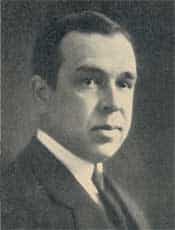Located among the correspondence in the Robert Dick Wilson Manuscript Collection, there is this letter from Dr. H. G. C. Hallock which has caught my attention.
Henry Galloway Comingo Hallock, was born on 31 March 1870, and prepared for ministry at the Princeton Theological Seminary, 1893-1896. Upon graduation he immediately took a post as a PCUSA missionary to China. In 1905 he withdrew to independent ministry and teaching, serving later as Professor of Homiletics in the department of theology at the University of China, Chenju, Shanghai, 1925-1927. For a time he had also been connected with the National Tract Society for China. Among some Princeton alumni information, there is indication that he remained in China up until at least June of 1942. Later returning to the United States, he died on 16 January 1951.
The letter that follows is a powerful testimony from the field of conflict. It is a revealing letter, telling the truth about evil, and a hopeful letter, speaking the truth about our Lord who sovereignly prevails over evil, purifying His Church, raising up a strong testimony to His grace and glory. Today, Rev. Hallock’s “prophecy” of China’s future rings true.
C.P.O.Box No. 1234, Shanghai, China, March 22, 1927.
Dear Friend,
I have written several times about our Bible School and of our work among its students and about our students’ work among the children and with the people in the country villages, I hope you are interested and that your heart has prompted you to help. There has not been time for a reply from you, as it takes a month each way for letters to go and come; but let me write again and tell you more. We are having very serious troubles in China. Fighting and unrest are all about us. I hear cannon booming and see many houses burning in Shanghai now as I write. Tho’ our Bible School is in the danger zone yet we have not been molested in the least. The militarists have closed a secular school of 600 pupils near us, as the generals feared the students were cutting the telegraph wires, R.R. tracks, and doing other mischief; but our Bible School goes on without interference. We are very glad and thankful to our Heavenly Father. We are grateful also that you have been praying for us.
Pray much also for China. An idea is abroad that a spirit of nationalism is among the people. This is largely a mistake. I do wish there were a spirit of real nationalism abroad, the leaders seeking the real good of their country and people; but I am sorry it is not so. The people are driven about in fear—like a flock of sheep pursued by mad— dogs or wolves—by men in the pay of Bolshevists. Lest these beasts of men be moved by pity for their own people the Bolshevists enlist perfect strangers from a distance to carry on propaganda, terrorize people, stir up strikes and shoot those too poor to strike, initiating a reign of terror, making the workers afraid to work—lest they be killed for working or their wives and children be killed while they work. As soon as ample protection is provided the people are very glad to flock back to work. The so-called Nationalists, led by the Bolshevists, say they are seeking the good of the people; but wherever they go they rob and kill the people and smash up schools, hospitals, churches and Chinese temples. You friends in good old America don’t want them and can largely keep the Bolshevists out; but the Chinese are not able to do so, so these fiends carry on with a high hand. There seems to be no limit to their deviltries. They cry, “Down with imperialists! Give the people freedom!” but they themselves are tyranic imperialists, and crush freedom. They are domineering overlords making a comparatively free people slaves. Freedom is impossible where they come. Like fierce, wild animals they are over-running the country, and the people, poor and rich alike, are fleeing for their lives.
But amid the deep gloom there appears a bright cloud still. God will overrule it all to His glory—is doing so. The church is being tried as by fire. The true Christians will remain true—will become more “loyal and true—and the dross will be removed. The “rice Christians” and all who are not true will desert and so the church will be refined. The church needs purging and it is being purged “with a vengeance.” And then, too, the scattered loyal Christians, as in the times of the Acts of the Apostles, are preaching the Gospel wherever they flee. The Bolshevists try to beat out the fire; but they only scatter the sparks. The flames spring up in numbers of unthinkable places. The missionaries have had to leave their stations; but it casts their Chinese Christians wholly into the loving arms of the dear Lord where they renew their strength, running and not weary, walking and not faint. Now is the time to bear the Christians up in the arms of prayer as you have never done before. Pray much, too, for the native preachers and Bible women, and also for the young men in our Bible School. They are staying firm in the school tho’ dangers are all around. — Shanghai just captured. Many Chinese killed. I can’t well flee. God guards. P.O. is closed. If this arrives you’ll know all’s well.
Yours in Christ’s glad service,
(Rev.) H. G. C. Hallock.
[emphasis added]

